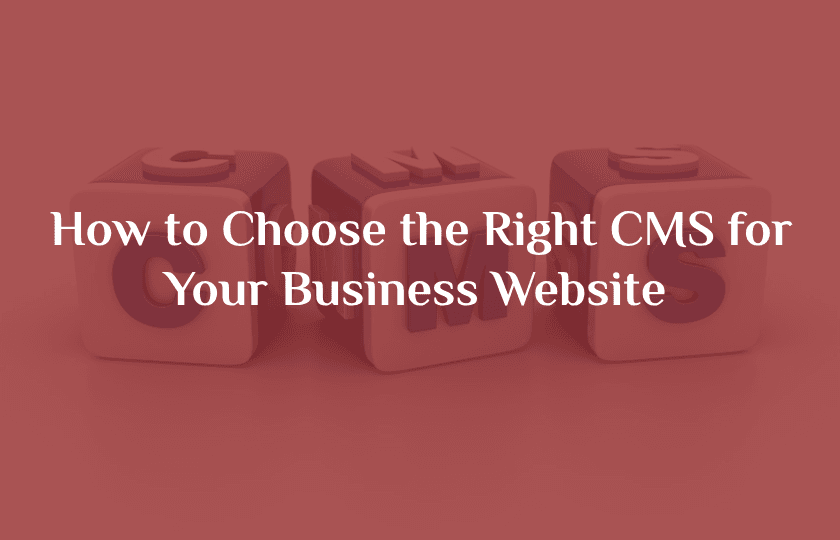In today’s fast-paced digital world, having a user-friendly, efficient, and scalable website is essential for business success. A Content Management System (CMS) plays a critical role in website development and maintenance. It allows business owners and marketers to easily create, manage, and modify digital content without needing extensive technical knowledge. However, with the multitude of CMS options available, choosing the right one for your business can be overwhelming.
This article will walk you through the process of selecting the best CMS for your business website. We will cover the most important factors to consider, compare popular CMS platforms, and highlight the key features that make a CMS the right choice for your unique business needs.
1. What is a CMS and Why is it Important?
A Content Management System (CMS) is software that enables users to create, manage, and modify content on a website without requiring specialized technical knowledge in coding. A CMS provides a user-friendly interface that allows content creators to add and edit text, images, videos, and other digital content on their website.
Why Do You Need a CMS?
Ease of Use: A good CMS makes it easy for non-technical staff members to contribute to website content without needing developer assistance.
Efficiency: CMS platforms often offer templates and drag-and-drop tools to streamline content creation and web page management.
Flexibility and Scalability: CMS platforms often come with a wide range of customizable features and plugins, making it easy to scale as your business grows.
Collaboration: Multiple users can work on a website at the same time, with specific roles and permissions assigned to manage content effectively.
SEO Optimization: Many CMS platforms come with built-in SEO tools, making it easier to optimize your website for search engines.
In short, a CMS simplifies the process of maintaining and growing your website, especially for businesses that want to focus on content without worrying about complex coding.

2. Key Factors to Consider When Choosing a CMS
When selecting a CMS for your business website, it’s important to consider your specific needs, business goals, and technical resources. Below are the key factors that should influence your decision.
1. Ease of Use
The CMS you choose should be easy to use for both you and your team. It should offer an intuitive interface that requires minimal technical expertise to navigate. Some CMS platforms offer drag-and-drop editors that simplify the design and layout process, while others may require more technical know-how to fully customize.
User-Friendly Interface: Look for a CMS that provides a simple dashboard with clear navigation and tools for adding and editing content.
Customization Options: Ensure that the platform allows for customization of templates and page layouts, so your website can grow with your business.
2. Scalability and Flexibility
Your website will likely evolve over time, so it’s essential to choose a CMS that can grow with your business. The CMS should allow you to add new features, plugins, and integrate with third-party tools as your needs change.
Scalability: Ensure that the CMS can handle your site’s growth. Whether you anticipate a growing product catalog, expanding content, or increasing web traffic, scalability is key.
Customization Options: A good CMS allows you to add functionalities and modify layouts without requiring a complete website overhaul. Look for platforms with a wide range of plugins and integration options.
3. Security Features
Since websites are prime targets for hackers, security should be a top priority when selecting a CMS. Choose a CMS that provides robust security features, regular updates, and the ability to implement security plugins.
SSL Certificate: Ensure the CMS supports the integration of an SSL certificate to encrypt data between the user’s browser and your website.
Regular Updates: A CMS with regular security patches will help protect your site from vulnerabilities.
Role-Based Access Control: Look for CMS platforms that allow you to assign user roles and permissions, so you can control access to sensitive data and functionalities.
4. SEO Capabilities
A CMS with built-in SEO tools will help improve your website’s visibility on search engines. Features like customizable meta tags, sitemaps, and image optimization are essential for SEO success.
SEO Tools: Ensure that the CMS you choose has built-in tools for on-page SEO such as custom URLs, title tags, meta descriptions, and header tags.
Mobile Optimization: Since search engines prioritize mobile-friendly websites, ensure that the CMS supports responsive design for mobile optimization.
5. Support and Community
Choosing a CMS with a robust support system and an active community can save you time and effort in troubleshooting issues. Platforms with large user communities are often easier to work with because you can access forums, FAQs, and tutorials.
Support Availability: Choose a CMS with customer support via email, live chat, or phone, especially if you’re running a business that requires quick fixes and assistance.
Documentation and Tutorials: A CMS with detailed documentation and online tutorials can help you learn the platform and solve problems independently.
6. Cost
While there are several free CMS platforms, you should also factor in the cost of paid plans, themes, and plugins that may be required to fully optimize your website.
Upfront Costs: Consider the initial costs involved in setting up and customizing the CMS, including design and plugin fees.
Ongoing Maintenance Costs: Evaluate the cost of hosting, security, updates, and any subscription fees for premium themes or plugins.

3. Top CMS Platforms for Business Websites
There are numerous CMS platforms available, each with its unique strengths and weaknesses.
Below are some of the most popular CMS options and their key features:
1. WordPress
WordPress is the most widely used CMS in the world, powering over 40% of all websites. It’s known for its flexibility, ease of use, and large community.
Pros:
Huge Plugin Library: WordPress has thousands of plugins to add new features, from SEO tools to e-commerce functionality.
Customizability: You can customize your site using both themes and plugins.
SEO-Friendly: With plugins like Yoast SEO, WordPress provides excellent SEO capabilities.
Community Support: Being the most popular CMS, it has an extensive community, tutorials, and forums.
Cons:
Requires Regular Updates: You need to stay on top of updates for security and functionality.
Can Be Resource-Intensive: Large websites with lots of plugins may require more resources and hosting power.
2. Wix
Wix is a popular website builder that’s known for its simplicity. It’s ideal for small businesses that need a simple, easy-to-use platform.
Pros:
Drag-and-Drop Builder: Wix makes it easy to design your site with no coding required.
All-Inclusive: Wix offers hosting, design, and CMS features all in one platform.
Affordable: Wix offers a free version (with ads) and several affordable premium plans.
Cons:
Limited Customization: While it’s easy to use, it can be less customizable than more robust platforms.
Limited Scalability: Wix is not as scalable as platforms like WordPress or Joomla, making it less ideal for rapidly growing businesses.
3. Shopify
If you’re running an e-commerce website, Shopify is a CMS specifically designed for online stores. It’s one of the most popular platforms for e-commerce businesses.
Pros:
E-commerce Focused: Shopify offers excellent tools for product management, payment integration, and inventory control.
Easy to Use: The platform is easy to set up and use, even for beginners.
Security: Shopify provides built-in security features such as SSL certificates and secure payment gateways.
Cons:
Monthly Fees: Shopify has a monthly subscription, and some features require additional paid apps.
Less Flexibility: While it’s great for e-commerce, it can be less flexible than platforms like WordPress if you want to create a complex, content-heavy site.
4. Joomla
Joomla is another open-source CMS that is great for more advanced users who want a highly customizable and flexible platform.
Pros:
Highly Customizable: Joomla is more flexible than some CMS platforms, allowing you to create complex websites.
Multilingual Support: Joomla comes with built-in multilingual support, making it an excellent choice for international businesses.
Cons:
Steeper Learning Curve: Joomla is more complex and may require more technical knowledge to use effectively.
Smaller Community: While there is a Joomla community, it’s not as large or as active as WordPress’s community.
4. Conclusion:
Choosing the Right CMS for Your Business
Choosing the right CMS for your business website requires careful consideration of your business goals, technical skills, and long-term scalability needs. WordPress, Wix, Shopify, and Joomla are some of the most popular CMS platforms, each with its strengths and weaknesses.
When selecting a CMS, consider factors like ease of use, scalability, SEO capabilities, support, security features, and cost. Whether you’re running an e-commerce store, a blog, or a content-rich website, the right CMS can help streamline content management, improve your website’s performance, and support business growth.
By aligning your CMS choice with your specific business needs, you’ll be equipped to build a website that meets your goals and provides a better user experience for your visitors.



